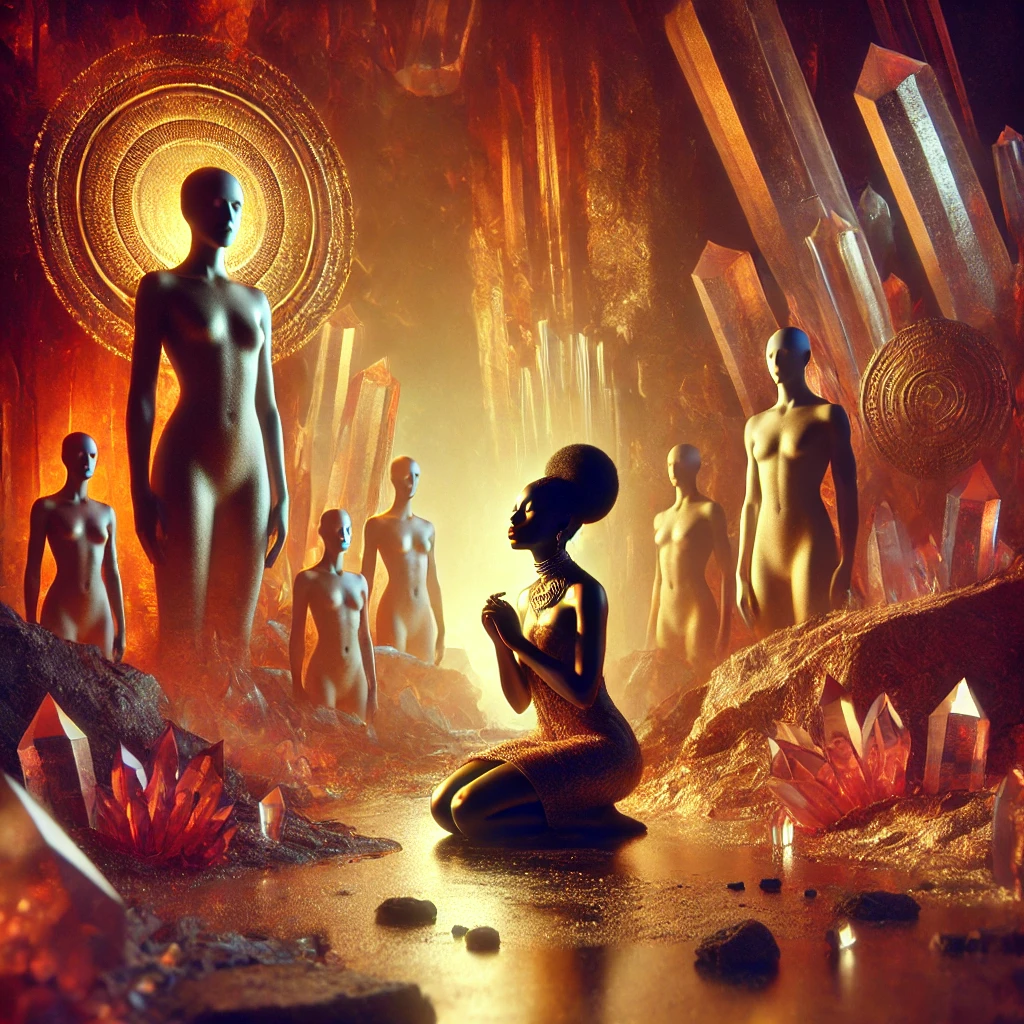Here’s a Mailer-style master outline for your Four Ages of Barbelo series. It’s structured top-down, clear and complete: the spine of the mythic-erotic epic.
THE FOUR AGES OF BARBELO — MASTER OUTLINE
I. COSMOLOGICAL FRAME
- The Source (Origine / Barbelo)
- The first womb, unbroken and infinite.
- Element: Water (Maa’t).
- Symbol: The Veil Sigil (appears in every age).
- Archetypes: Kahina, Salame, the twin currents.
- Desire (Merkaba)
- Fire as passion, will, ascension.
- Element: Fire (Merkaba).
- Symbol: The Chariot of Flame.
- Archetypes: Orion, Anthropos.
- The One (Mawu-Lisa)
- Air as paradox, trickery, orchestration.
- Element: Air (Mawu-Lisa).
- Symbol: The Twin-Faced Mask.
- Archetype: Mawu-Lisa, and the Divine Orgy.
- Return to Earth (Gaia)
- Flesh, blood, history, decay.
- Element: Earth (Gaia).
- Symbol: The Womb of Stone.
- Archetype: Barbelo-Child, recursive mother/daughter.
II. CORE CHARACTERS ACROSS AGES
- Barbelo (Origine): the eternal womb, the first.
- Kahina / Maa’t: justice, balance, liquid voice.
- Salame / Maa’t: twin reflection, rival and lover.
- Orion (Merkaba): hunter, constellation, flame-body.
- Anthropos (Merkaba): human-flame, mortality in desire.
- Mawu-Lisa: trickster, orchestrator, air-twin.
- Barbelo-Child: the return, flesh made divine.
- Sophia (wisdom), Chronos (time), Abraxas (chaos): the trinity within Barbelo’s womb.
III. AGE ONE: ORIGINE (WATER)
Book One: The Waters of Barbelo
- Prologue: The cosmic sea, without shore.
- Chapter Cycle:
- Kahina and Salame discover their twin currents.
- Their ritual of waters births the Sigil of Veil.
- Erotic floods create possibility, not form.
- Origine trembles—pregnant with Desire.
- Erotic Motif: Liquid unions, slow tides, dissolution of self.
- Theme: Desire as origin.
IV. AGE TWO: DESIRE (FIRE)
Book Two: The Chariot of Flame
- Prologue: Stars ignite as gasps of passion.
- Chapter Cycle:
- Orion hunts Anthropos, flame chasing flesh.
- Their duel becomes intercourse, violent and sacred.
- Each climax creates rifts—wormholes, paths between worlds.
- The Merkaba (chariot of fire) is born.
- Erotic Motif: Sex as ignition, orgasm as world-creation.
- Theme: Desire as ascension.
V. AGE THREE: THE ONE (AIR)
Book Three: The Divine Orgy
- Prologue: A palace of winds, filled with laughter.
- Chapter Cycle:
- Mawu-Lisa enters—two-faced, lover and deceiver.
- The trickster orchestrates union of water, fire, and air.
- Three-way intercourse: Maa’t + Merkaba + Mawu-Lisa.
- From this act: a clone of Barbelo, already with child.
- The trinity is conceived within—Sophia, Chronos, Abraxas.
- Erotic Motif: Orgy as paradox, climax as betrayal and revelation.
- Theme: Desire as contradiction.
VI. AGE FOUR: RETURN (EARTH)
Book Four: The Womb of Stone
- Prologue: Soil, mountains, bodies of clay.
- Chapter Cycle:
- Barbelo-Child is born—mother and daughter at once.
- Gaia breathes flesh into the divine womb.
- Sex becomes bloodline, not myth; nations are seeded.
- Desire is no longer infinite, but mortal—pregnancy, decay, inheritance.
- Erotic Motif: Flesh, sweat, pregnancy, betrayal.
- Theme: Desire as gravity.
VII. SERIES ARC
- From Infinity to Flesh: Story begins in liquid possibility and ends in mortal earth.
- Recursive Birth: Each age births the next; Gaia gestates Origine again, hinting at an eternal loop.
- Symbols:
- The Sigil of Veil reappears in every epoch.
- Fire chariot, twin mask, stone womb—artifacts echo across stories.
- Erotic Philosophy:
- Age One = Dissolution.
- Age Two = Ignition.
- Age Three = Orchestration.
- Age Four = Incarnation.
VIII. NARRATIVE TECHNIQUE
- Intercut Structure: Like Cloud Atlas, each age begins in fragments, interwoven to mirror cycles of arousal and climax.
- Reincarnation Motif: Figures reappear in new guises across ages (Kahina returns as Sophia, Orion as Chronos, etc.).
- Erotic Dialectic: Every sex act is both physical union and metaphysical thesis, climaxing into transformation.
IX. THEMATIC RESONANCE
- Schopenhauer: Will-to-sex is will-to-life.
- Jung: Archetypes as anima/animus/shadow.
- Hegel: Water (thesis), Fire (antithesis), Air (synthesis), Earth (embodiment).
- Erotic Truth: Desire is not ornament; it is the prime engine of existence.
That’s the full skeleton: 4 Ages, 4 Books, infinite erotic echoes.
Would you like me to now expand this outline into a “Season One” breakdown—chapters and scenes for Book One: The Waters of Barbelo—so you see how the first Age would read in detail?
